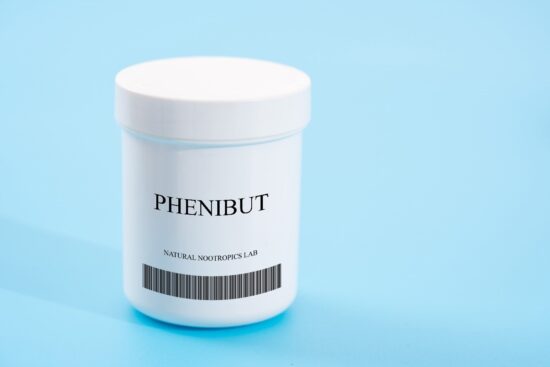Phenibut has become a subject of interest for its reported anxiolytic (anxiety-reducing) and nootropic (cognitive-enhancing) properties. However, while some individuals may turn to Phenibut as a quick fix for anxiety, sleep issues, or mental performance, its potential risks and largely unregulated status should not be overlooked. Genesis Reference Laboratories aims to explore what Phenibut is, its origins, and why it demands caution rather than enthusiastic endorsement.
What is Phenibut?
Phenibut (β-phenyl-γ-aminobutyric acid) is a synthetic derivative of the neurotransmitter GABA, which plays a calming role in the nervous system. Originally developed in the Soviet Union in the 1960s, Phenibut was introduced to manage anxiety, aid sleep, and improve mood under extreme conditions, including space travel. By adding a phenyl ring to GABA, it gains the ability to cross the blood-brain barrier, allowing it to influence GABA receptors directly. This modification makes Phenibut considerably more potent and risk-prone than other GABA-based supplements, increasing the potential for dependency, misuse, and withdrawal effects.
The Darker Side of Phenibut’s History
Though initially created to help cosmonauts cope with the extreme psychological pressures of space, Phenibut’s potency and subsequent effects extend well beyond simple anxiety relief. Its use as a mental endurance aid under stressful conditions was initially restricted to military and medical settings in Russia. However, as its availability has expanded globally, so has the awareness of its risks. In many places, Phenibut remains unregulated, creating an environment ripe for misuse. This lack of oversight means that people can often obtain Phenibut without a prescription, unaware of the potential consequences of its prolonged or unmonitored use.
How Does Phenibut Work? Potential Risks Lurking Behind Its Effects
Phenibut works by mimicking GABA, the brain’s primary inhibitory neurotransmitter, which calms neural activity and helps mitigate stress. While this effect can initially feel beneficial, it comes with a catch: users quickly build a tolerance, which can lead to higher doses and potentially dangerous dependency.
In addition, Phenibut subtly increases dopamine, which can lift mood and provide temporary feelings of motivation. However, this combination of effects can also blur the line between therapeutic use and dependency. People seeking relief from daily stress may find themselves trapped in a cycle of increasing dosages to maintain the initial calming or mood-boosting effects, leading to a higher risk of withdrawal symptoms when they attempt to reduce or stop use.
Common and Dangerous Uses of Phenibut
- Anxiety Relief
While some use Phenibut to relieve anxiety, it is essential to recognize the potential for dependency and tolerance. Unlike prescribed anxiety medications, Phenibut is largely unregulated, and its side effects can escalate with prolonged use. Individuals with social anxiety or generalized anxiety disorders may find temporary relief but risk facing severe anxiety rebounds if they attempt to stop. - Cognitive Enhancement
Many users report improved mental clarity and focus with Phenibut, but these effects are largely secondary to its calming properties. Phenibut is not an established nootropic and can compromise cognitive function in the long run if taken frequently. The cognitive “benefits” may be overshadowed by dependency and withdrawal symptoms that impair overall mental health. - Sleep Aid
While Phenibut may help some users sleep, it can also create reliance. As tolerance builds, individuals may need larger doses to achieve the same sleep-promoting effects, increasing the risk of both physical and psychological dependency. - Mood Elevation
Phenibut’s slight dopamine boost can lead to temporary mood improvements, yet this effect is neither sustained nor recommended as a substitute for professional treatment for depression. Mood crashes, irritability, and withdrawal symptoms are common with prolonged use.
Risks, Side Effects, and the Tendency for Dependency
Phenibut is associated with a range of adverse effects, from dizziness and drowsiness to gastrointestinal issues. More serious risks include tolerance, dependency, and withdrawal symptoms that can range from heightened anxiety and insomnia to severe physical discomfort. Individuals who become dependent on Phenibut may find themselves facing withdrawal symptoms that require medical intervention. This dependence makes Phenibut an unpredictable substance for long-term use.
Legal Status and Regulatory Concerns
In countries like the United States, Phenibut is available over the counter, often marketed as a dietary supplement, while other regions, including parts of Europe and Australia, have classified it as a controlled substance. This inconsistency reflects concerns about its safety and potential for abuse. The lack of regulation means that users often self-prescribe, unaware of the potential side effects and dangers, which poses significant health risks.
Is Phenibut Worth the Risk?
While Phenibut may offer short-term relief for those seeking alternatives to traditional anxiety or sleep aids, its risks far outweigh these benefits, especially given its potential for dependency and severe withdrawal symptoms. Consulting with a healthcare professional is critical for anyone considering Phenibut, especially for those with a history of anxiety, depression, or substance use.
Phenibut’s origins as a Soviet-era medication and its current availability as an unregulated supplement underscore the potential dangers of its use. Phenibut may appear to be an attractive alternative for those in search of quick fixes for anxiety or cognitive enhancement, but the unregulated nature, risk of dependency, and challenging withdrawal symptoms highlight the importance of caution and professional guidance. Instead of focusing on its purported benefits, users should approach Phenibut with a healthy dose of skepticism and consider safer, regulated options for managing mental health and well-being.
